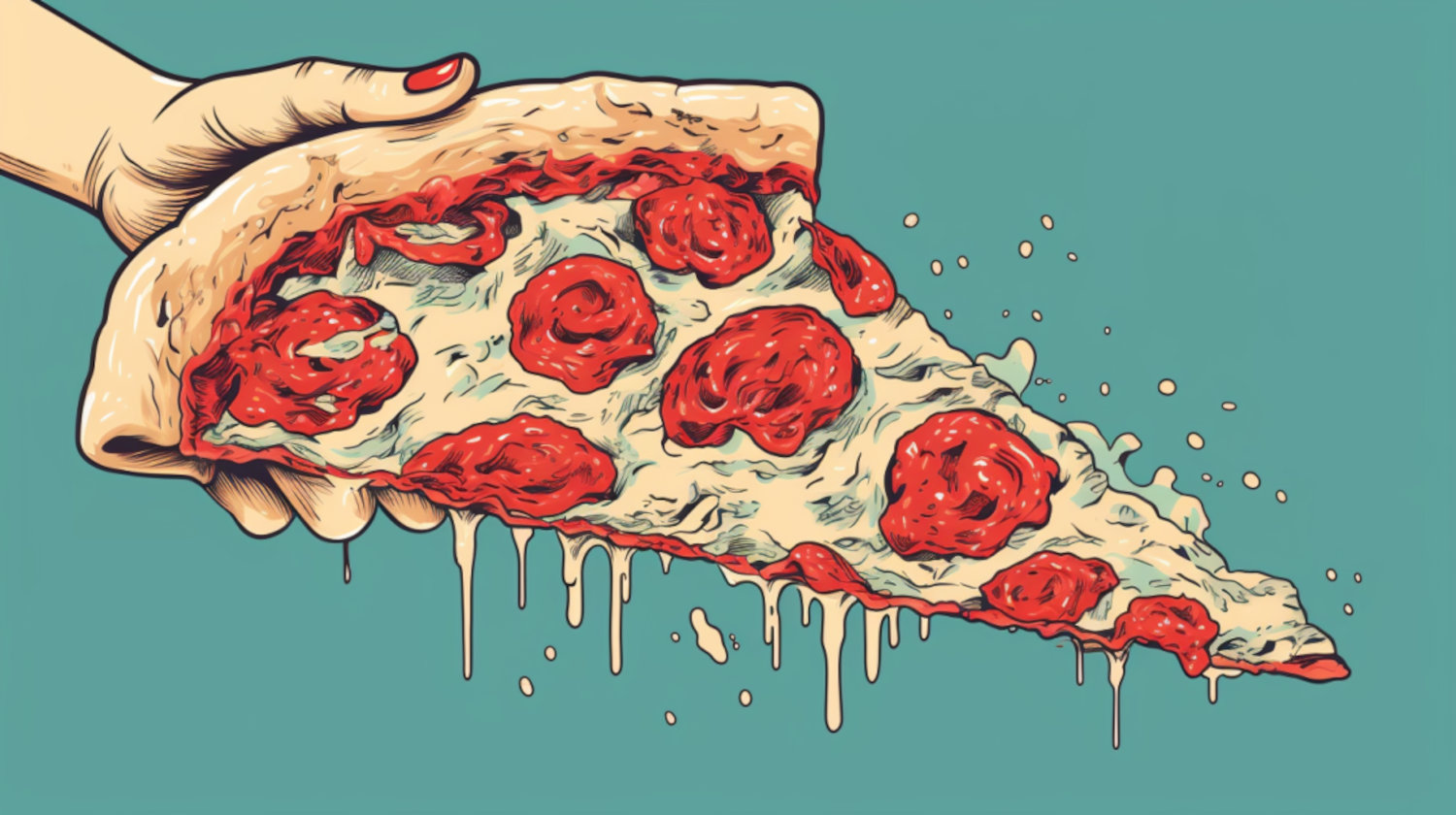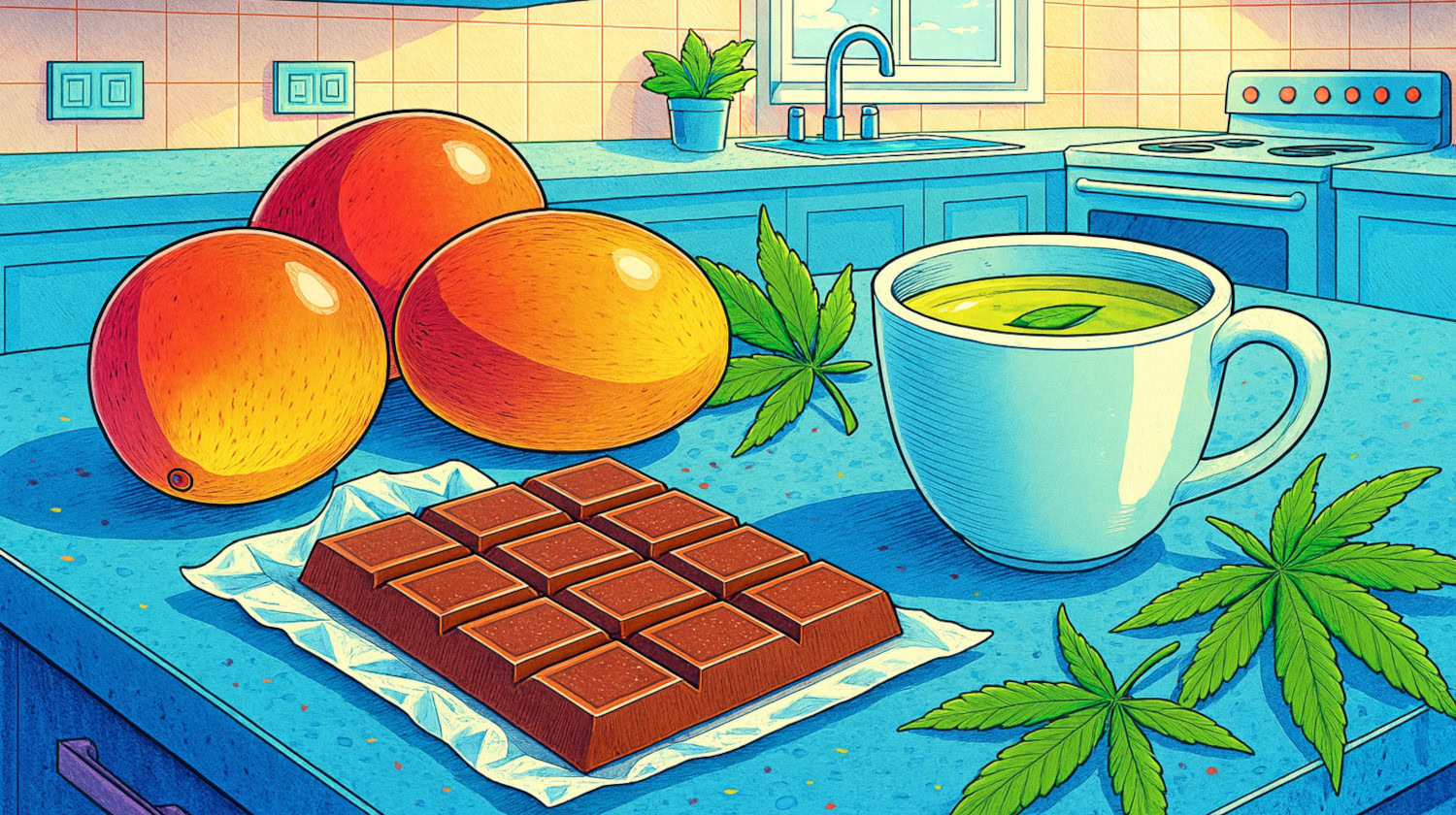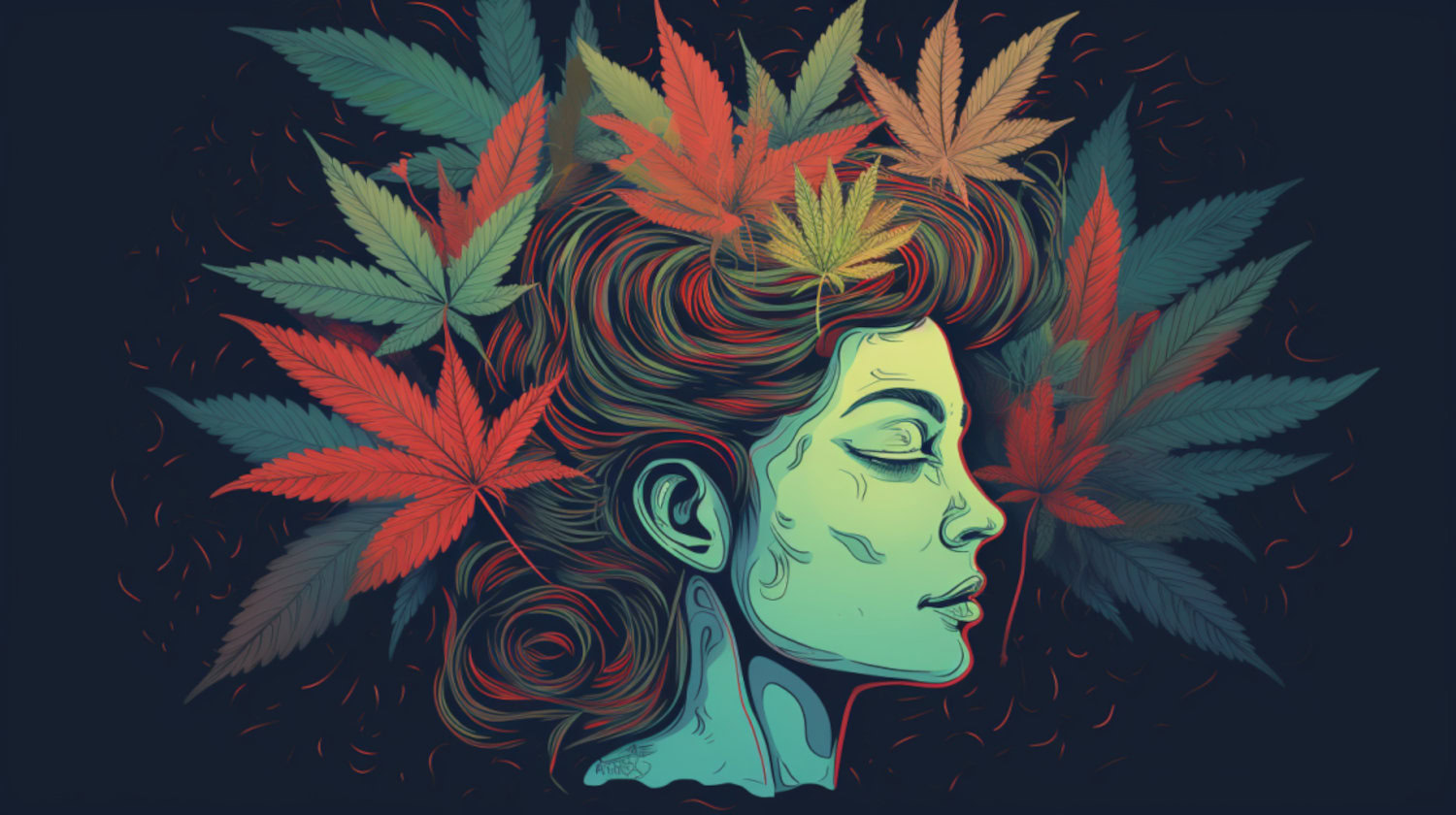When Harold and Kumar got the munchies in 2004, pop culture thrust cannabis consumers deeper into the stereotypical stoner sphere. It wasn't until a mind-blowing study was published in Current Biology that people really started to question the munchie phenomenon.1
According to neuroscientist Shawn Lockery and researchers at the University of Oregon, worms also get the munchies. Science calls it "hedonic feeding" - the desire to consume foods for pleasure when devoid of physical hunger.
While it might lead to uncontrollable binge eating and weight gain if not handled correctly, the American Cancer Society, Americans for Safe Access, and several authorities claim that the munchies may promote healthy appetite in patients with human immunodeficiency virus (HIV) and cancer.2
The misconstrued link between "stoners" and "the munchies" is outdated and not entirely accurate. Not all cannabis consumers get "out of key" - a Cambridge Dictionary translation of the Italian word "stonato," where the stoner name possibly originated.
If you experience a grumbling stomach, a rapid-onset sweet tooth, or find yourself reaching for high-calorie foods after weed, you're not alone.
But why does marijuana make you hungry?
What Causes Munchies?

Through interaction with both CB1 and CB2 receptors, cannabis produces differing appetite-influencing effects. However, the cannabis compound tetrahydrocannabinol (THC) is the main culprit behind what causes munchies.
THC binds to and triggers the activation of CB1 receptors in intoxication and mind-alteration. Whereas delta-9 THC sends appetite into overload, the anorexigenic properties of CBD decrease food intake, especially among high-BMI individuals.3
Cannabis' appetite regulation and body weight maintenance abilities suggest its suitability for chemotherapy-related nausea and general appetite loss. However, adverse effects of CB1 agonists (in wasting disorders) or antagonists (in obesity and diabetes) have restricted their therapeutic utility.4
THC may cause peptide tyrosine tyrosine (PYY) levels to dwindle, leading to skyrocketing ghrelin production via activation of the mTOR (mammalian target of rapamycin) pathway, thus resulting in appetite gain. Various other substances may boost hunger, including tricyclic antidepressants (TCAs), ginger, vitamin C, megestrol acetate, and oxandrolone.
Ghrelin, the "hunger hormone," assists with meal initiation, appetite, and food intake. Total ghrelin levels are higher in oral cannabis consumers than in smokers and vapers. Cannabis' effects flood in quickly with vapor but wear off faster than with edibles, so the munchies may intensify if you ingest weed.5
A study published in Obesity Research and Clinical Practice links carbonated water consumption with weight gain due to ghrelin blood level tripling compared with plain or de-gassed water drinkers. Since this hormone increases appetite, the possible link between cannabis consumption and increased hunger is clear.6
Why Does Weed Make You Hungry?
Cannabis compounds (cannabinoids) react with the endocannabinoid system (ECS) to mediate their effects. This intricate system of endocannabinoids and cannabinoid receptors regulates physiological processes, including hunger and digestion, memory and learning, sleep, pain control, temperature management, immune responses, and emotions.
These are some of the key factors that contribute to "the munchies":
- THC
THC mediates its effects via the ECS, controlling the activation of various receptors. However, THC binds predominantly with the CB1 receptor within the hypothalamus, making it responsible for amplifying appetite and ingestive behaviors. CB2 is more heavily involved in neuroprotective, anti-inflammatory, and immune cell function.7
A preprint study analyzed nine clinical or observational studies and found that THC may enhance healthy gut flora and ease GI disorders like abdominal pain and diarrhea.8 Conversely, it may cause food to leave the stomach more slowly.9
- CBG
Some people get hungry when high on high-THC, intoxicating cannabis, but not hemp-derived cannabis products. In animal studies, the non-intoxicating cannabinoid cannabigerol (CBG) boosts appetite.10 Although it doesn't tickle the mind as much as THC, cannabis-derived CBG also harbors abundant therapeutic benefits like antibacterial, antifungal, and anti-inflammatory effects.11
- Endocannabinoids
Studies demonstrate that body-produced endocannabinoids, such as L-allylglycine (2-AG) and anandamide, bind to CB1, stimulating appetite and food intake, whereas oleylethanolamide (OEA) may inhibit hunger.12 Certain body-produced chemicals, such as endorphins, serotonin, and dopamine, harbor effects similar to THC in promoting a healthy appetite.
- Dopamine
Dopamine plays a role in modulating appetite, and THC's dopamine-releasing activity may play a role in the increase of hunger.13,14
- Ghrelin
Ghrelin, AKA "the hunger hormone," is mainly responsible for the body's eating schedule. This hormone instructs you when to eat and how much to eat. One clinical trial proved ghrelin's influence on appetite. The trial saw cannabis-consuming participants consume significantly more milkshakes than placebo users. THC users also "liked" and "wanted" high-calorie images over low-calorie food images more than placebo users.15
- CB1 Receptor Activation
Cannabis — a potential option for patients with wasting syndrome (cachexia) and eating disorders like anorexia — may make food more enjoyable, with CB1 receptor interaction capable of enhancing the sense of flavor appeal.16 Most evidence attributes the appetite-stimulant actions of cannabinoids to CB1 receptors in the hypothalamus, but emerging research signifies that CB2 receptors may also cause excess food intake.
These findings fortify the hypothesis that the ECS regulates food palatability and that the cannabinoid system works simultaneously with dopamine systems to ignite the natural rewards process.17
Does CBD Make You Hungry?
There hasn't been much research into CBD's impact on hunger, but the few studies that have been done actually point in a different direction.
Researchers that explored this topic found that CBD is an antagonist to the ECS receptors, including those in the gastrointestinal tract. In 2022, one review of studies reported that CBD appears to reduce food intake.18
A different review published in 2023 came to a similar conclusion. These researchers noted that CBD’s antagonistic effects on the CB1 and CB2 receptors improved the metabolic conditions that affected weight. Blocking the receptors induced weight loss, improved glucose levels, and reduced fibrosis in several chronic conditions.19
How Long Do the Munchies Last?

The longer cannabis remains in your system and you feel its effects, the longer you'll run a munchies marathon. How long cannabis remains in your system depends on consumption quantity, product type, method of administration, and potency. This is why it’s crucial to always read the label.
Long-lasting, high-dosage strains and product types that linger in the system (such as edibles) may impact the duration of a "cannabis munchies" binge. Vaporized cannabis goes into effect within minutes, so users may get hungry sooner, whereas oral products have an average onset time of 30 minutes to two hours. This slow absorption results in longer-lasting effects of 4-12 hours, depending on product type and dosage.20
If it's a high-quality, properly labeled product from a renowned brand or company, cannabis may provide more pure and persistent results. Customers often report that high potency and quality-sourced cannabis products increase appetite, even if it is CBD-dominant with traces of THC.
Remember that frequent high doses of THC can suppress CB1 receptors, creating a tolerance to THC.21 This may limit hunger, so dosage consideration is essential. Start small, and you'll likely eat less; go high, and there's a greater risk of intense hunger. If you choose a super high-THC option, you may eventually build a tolerance to the munchies altogether.
Can You Use Weed Without Getting the Munchies?
Of course you can, but select a strain that doesn't increase your hunger too much. Some strains of cannabis are good for promoting increased appetite, whereas other strains of cannabis are good for weight loss and hunger management.
Rodent studies of THCV for appetite loss reveal that this compound may cause appetite to plunge, up-regulate energy metabolism, and improve satiety. These qualities potentially make THCV a promising weight loss aid among obese and type 2 diabetic patients.22
CBD also has an appetite suppressant effect by mediating CB1 and CB2 receptors. That said, you may be able to sidestep the munchies by opting for low-THC strains, such as hemp strains containing less than 0.3% THC.
People find that strains with a high CBD or fair THCV content are most effective. These can include:
- Remedy - 18% CBD
- Cherry Wine - 16% CBD
- Ringo's Gift - 10-15% CBD or higher
- Pineapple Purps - 4% THCV
- Doug's Varin - 3-5% THCV
- Royal THCV - 7% THCV
How Do You Manage the Munchies?

Handling cannabis-induced hunger requires some sweet or savory satisfaction. Knowing this, be prepared with munchies in mind.
Here's how:
- Eat Food Before Weed
Weed is always better on a full stomach, as are most medicinal substances. By preparing for your cannabis experience with satisfied hunger, you may be able to deter THC-laden strains from sending your appetite through the roof later.
- Limit Fat and Sugar Intake
THC binds to fat, and reduced sugar intake spurs leptin production.23,24 Leptin maintains appetite by monitoring cannabinoid levels in the brain.25
- Prepare Healthy Snacks
Try to avoid consuming cannabis in a setting where lots of junk food is easily accessible. If you can, prepare low-fat, low-sugar snacks, such as:
- A bowl low-sugar sweets, like dried fruit
- Granola bars
- Raw vegetable sticks and hummus
- Pesto salad quesadillas
- Natural popcorn without butter
- Fresh fruit
You might also want to avoid snacks containing hunger-boosting flavonoids, such as apples, blueberries, grapes, pears, prunes, and strawberries.26
- Switch Up the Location
Shifting locations post-consumption is an effective way of diverting your attention from food. You might also be able to enhance the effects of cannabis by changing your scenery. Moreover, getting distracted in nature and engaging in physical activity is the ultimate way to increase leptin.
If you still feel consumed by hunger after using cannabis, consider brushing your teeth and having a shower to refresh your senses. You can experiment with different strains to enjoy cannabis-inspired experiences without being tempted by refrigerator contents.
References
- Levichev A, Serge Faumont, Berner RZ, et al. The conserved endocannabinoid anandamide modulates olfactory sensitivity to induce hedonic feeding in C. elegans. Current Biology. 2023;33(9):1625-1639.e4. doi:https://doi.org/10.1016/j.cub.2023.03.013 ↩︎
- Sansone RA, Sansone LA. Marijuana and body weight. Innov Clin Neurosci. 2014;11(7-8):50-54. ↩︎
- Pinto JS, Martel F. Effects of Cannabidiol on Appetite and Body Weight: A Systematic Review. Clin Drug Investig. 2022;42(11):909-919. doi:10.1007/s40261-022-01205-y ↩︎
- O'Sullivan SE, Yates AS, Porter RK. The Peripheral Cannabinoid Receptor Type 1 (CB1) as a Molecular Target for Modulating Body Weight in Man. Molecules. 2021;26(20):6178. Published 2021 Oct 13. doi:10.3390/molecules26206178 ↩︎
- Farokhnia M, McDiarmid GR, Newmeyer MN, et al. Effects of oral, smoked, and vaporized cannabis on endocrine pathways related to appetite and metabolism: a randomized, double-blind, placebo-controlled, human laboratory study. Translational Psychiatry. 2020;10(1). doi:https://doi.org/10.1038/s41398-020-0756-3 ↩︎
- Eweis DS, Abed F, Stiban J. Carbon dioxide in carbonated beverages induces ghrelin release and increased food consumption in male rats: Implications on the onset of obesity. Obes Res Clin Pract. 2017;11(5):534-543. doi:10.1016/j.orcp.2017.02.001 ↩︎
- Bie B, Wu J, Foss JF, Naguib M. An overview of the cannabinoid type 2 receptor system and its therapeutic potential. Curr Opin Anaesthesiol. 2018;31(4):407-414. doi:10.1097/ACO.0000000000000616 ↩︎
- Thu MS, Ondee T, Hall SR, et al. Cannabis-Microbiome Interactions in Varied Clinical Contexts: A Comprehensive Systematic Review. MedRXiv. Published online January 3, 2023. doi:https://doi.org/10.1101/2022.12.31.22284080 ↩︎
- Camilleri M. Cannabinoids and gastrointestinal motility: Pharmacology, clinical effects, and potential therapeutics in humans. Neurogastroenterol Motil. 2018;30(9):e13370. doi:10.1111/nmo.13370 ↩︎
- Brierley DI, Samuels J, Duncan M, Whalley BJ, Williams CM. Cannabigerol is a novel, well-tolerated appetite stimulant in pre-satiated rats. Psychopharmacology (Berl). 2016;233(19-20):3603-3613. doi:10.1007/s00213-016-4397-4 ↩︎
- Robaina Cabrera CL, Keir-Rudman S, Horniman N, Clarkson N, Page C. The anti-inflammatory effects of cannabidiol and cannabigerol alone, and in combination. Pulm Pharmacol Ther. 2021;69:102047. doi:10.1016/j.pupt.2021.102047 ↩︎
- Aguilera Vasquez N, Nielsen DE. The Endocannabinoid System and Eating Behaviours: a Review of the Current State of the Evidence. Curr Nutr Rep. 2022;11(4):665-674. doi:10.1007/s13668-022-00436-x ↩︎
- Bloomfield MA, Ashok AH, Volkow ND, Howes OD. The effects of Δ9-tetrahydrocannabinol on the dopamine system. Nature. 2016;539(7629):369-377. doi:10.1038/nature20153 ↩︎
- Volkow ND, Wang GJ, Baler RD. Reward, dopamine and the control of food intake: implications for obesity. Trends Cogn Sci. 2011;15(1):37-46. doi:10.1016/j.tics.2010.11.001 ↩︎
- Weltens N, Depoortere I, Tack J, Lukas Van Oudenhove. Effect of acute Δ9-tetrahydrocannabinol administration on subjective and metabolic hormone responses to food stimuli and food intake in healthy humans: a randomized, placebo-controlled study. The American Journal of Clinical Nutrition. 2019;109(4):1051-1063. doi:https://doi.org/10.1093/ajcn/nqz007 ↩︎
- Coccurello R, Maccarrone M. Hedonic Eating and the “Delicious Circle”: From Lipid-Derived Mediators to Brain Dopamine and Back. Frontiers in Neuroscience. 2018;12. doi:https://doi.org/10.3389/fnins.2018.00271 ↩︎
- De Luca MA, Solinas M, Bimpisidis Z, Goldberg SR, Di Chiara G. Cannabinoid facilitation of behavioral and biochemical hedonic taste responses. Neuropharmacology. 2012;63(1):161-168. doi:10.1016/j.neuropharm.2011.10.018 ↩︎
- Pinto JS, Martel F. Effects of Cannabidiol on Appetite and Body Weight: A Systematic Review. Clin Drug Investig. 2022;42(11):909-919. doi:10.1007/s40261-022-01205-y ↩︎
- Dörnyei G, Vass Z, Juhász CB, Nádasy GL, Hunyady L, Szekeres M. Role of the Endocannabinoid System in Metabolic Control Processes and in the Pathogenesis of Metabolic Syndrome: An Update. Biomedicines. 2023; 11(2):306.doi.org/10.3390/biomedicines11020306 ↩︎
- MacCallum CA, Russo EB. Practical considerations in medical cannabis administration and dosing. European Journal of Internal Medicine. 2018;49(49):12-19. doi:https://doi.org/10.1016/j.ejim.2018.01.004 ↩︎
- D'Souza DC, Cortes-Briones JA, Ranganathan M, et al. Rapid Changes in CB1 Receptor Availability in Cannabis Dependent Males after Abstinence from Cannabis. Biol Psychiatry Cogn Neurosci Neuroimaging. 2016;1(1):60-67. doi:10.1016/j.bpsc.2015.09.008 ↩︎
- Abioye A, Ayodele O, Marinkovic A, Patidar R, Akinwekomi A, Sanyaolu A. Δ9-Tetrahydrocannabivarin (THCV): a commentary on potential therapeutic benefit for the management of obesity and diabetes. J Cannabis Res. 2020;2(1):6. Published 2020 Jan 31. doi:10.1186/s42238-020-0016-7 ↩︎
- Sharma P, Murthy P, Bharath MM. Chemistry, metabolism, and toxicology of cannabis: clinical implications. Iran J Psychiatry. 2012;7(4):149-156. ↩︎
- Vasselli JR. The role of dietary components in leptin resistance. Adv Nutr. 2012;3(5):736-738. Published 2012 Sep 1. doi:10.3945/an.112.002659 ↩︎
- Balsevich G, Sticht M, Bowles NP, et al. Role for fatty acid amide hydrolase (FAAH) in the leptin-mediated effects on feeding and energy balance. Proc Natl Acad Sci U S A. 2018;115(29):7605-7610. doi:10.1073/pnas.1802251115 ↩︎
- Balsevich G, Sticht M, Bowles NP, et al. Role for fatty acid amide hydrolase (FAAH) in the leptin-mediated effects on feeding and energy balance. Proc Natl Acad Sci U S A. 2018;115(29):7605-7610. doi:10.1073/pnas.1802251115 ↩︎
The information in this article and any included images or charts are for educational purposes only. This information is neither a substitute for, nor does it replace, professional legal advice or medical advice, diagnosis, or treatment. If you have any concerns or questions about laws, regulations, or your health, you should always consult with an attorney, physician or other licensed professional.




